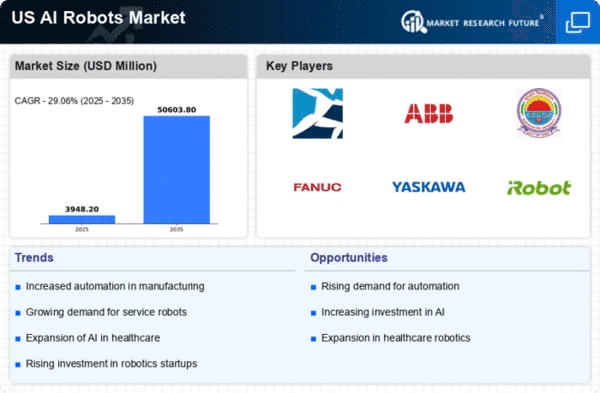Growing Labor Shortages
Labor shortages in various industries are driving the adoption of ai robots as a viable solution. The ai robots market is witnessing increased interest from sectors such as agriculture, manufacturing, and retail, where finding skilled labor has become increasingly challenging. As companies face difficulties in hiring and retaining workers, they are turning to automation to fill gaps in their workforce. This trend is particularly evident in agriculture, where ai robots are being utilized for tasks such as planting and harvesting, thereby enhancing productivity. The ongoing labor shortages are likely to sustain the demand for ai robots, as businesses seek to maintain operational efficiency despite workforce constraints.
Rising Demand for Efficiency
The ai robots market is experiencing a notable surge in demand for efficiency across various sectors. Industries are increasingly adopting automation to streamline operations, reduce costs, and enhance productivity. In the manufacturing sector, for instance, the integration of ai robots has led to a reported increase in output by approximately 30%. This trend is not limited to manufacturing; logistics and warehousing are also witnessing a shift towards automation, with ai robots optimizing inventory management and order fulfillment processes. As companies strive to remain competitive, the drive for efficiency is likely to propel the growth of the ai robots market, as organizations seek innovative solutions to meet consumer demands while minimizing operational costs.
Increased Investment in Robotics
Investment in robotics technology is a critical driver of the ai robots market. Venture capital funding and government grants are increasingly directed towards robotics startups and research initiatives. In 2025, investments in robotics are expected to exceed $10 billion in the US alone, reflecting a growing recognition of the potential benefits of automation. This influx of capital is likely to accelerate innovation and development within the ai robots market, enabling the creation of more sophisticated and versatile robotic solutions. As businesses recognize the long-term cost savings and efficiency gains associated with robotics, the trend of increased investment is expected to continue, further propelling market growth.
Technological Advancements in AI
Technological advancements in artificial intelligence are significantly influencing the ai robots market. Innovations in machine learning, computer vision, and natural language processing are enabling robots to perform complex tasks with greater accuracy and autonomy. For example, advancements in AI algorithms have improved robots' ability to navigate dynamic environments, making them more effective in applications such as delivery services and customer interaction. The market is projected to grow at a CAGR of around 25% over the next five years, driven by these technological breakthroughs. As AI capabilities continue to evolve, the potential for ai robots to transform various industries appears promising, suggesting a robust future for the market.
Regulatory Support for Automation
Regulatory support for automation is emerging as a significant driver of the ai robots market. Government policies aimed at promoting technological innovation and automation are creating a favorable environment for the adoption of ai robots. Initiatives that provide tax incentives for companies investing in automation technologies are encouraging businesses to integrate ai robots into their operations. Furthermore, safety regulations that facilitate the use of robots in workplaces are also contributing to market growth. As regulatory frameworks evolve to support automation, the ai robots market is likely to benefit from increased adoption across various sectors, fostering a culture of innovation and efficiency.
.png)
















